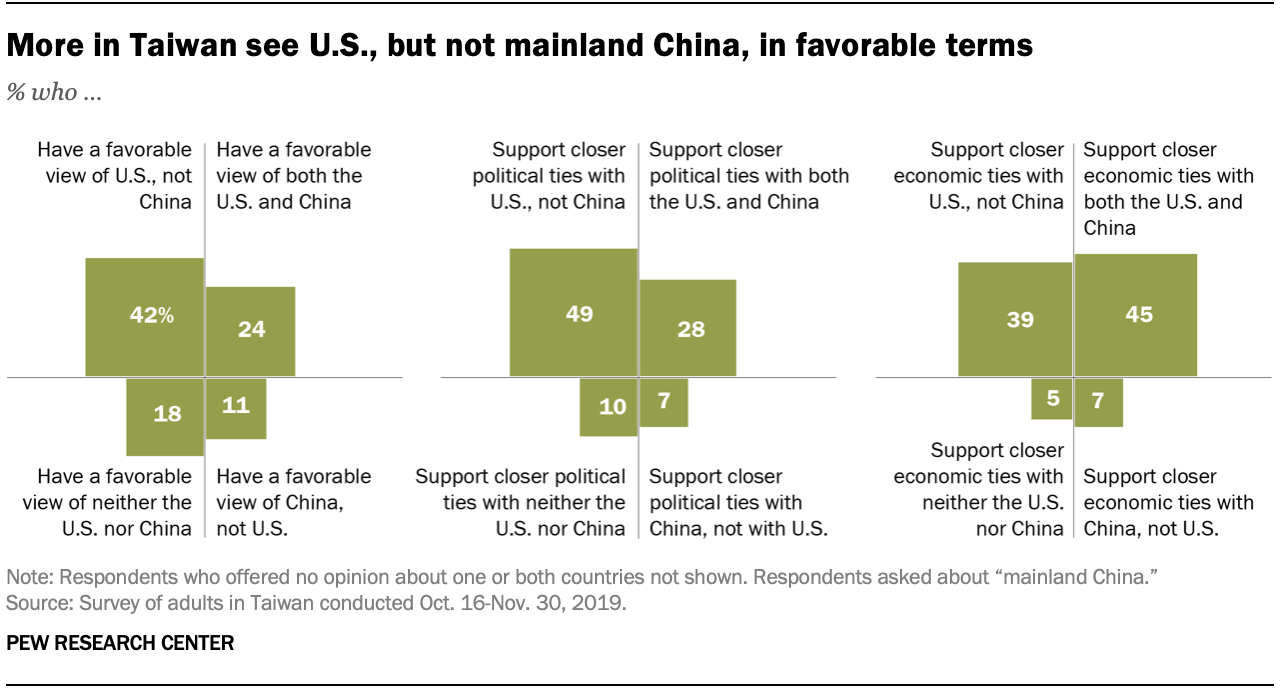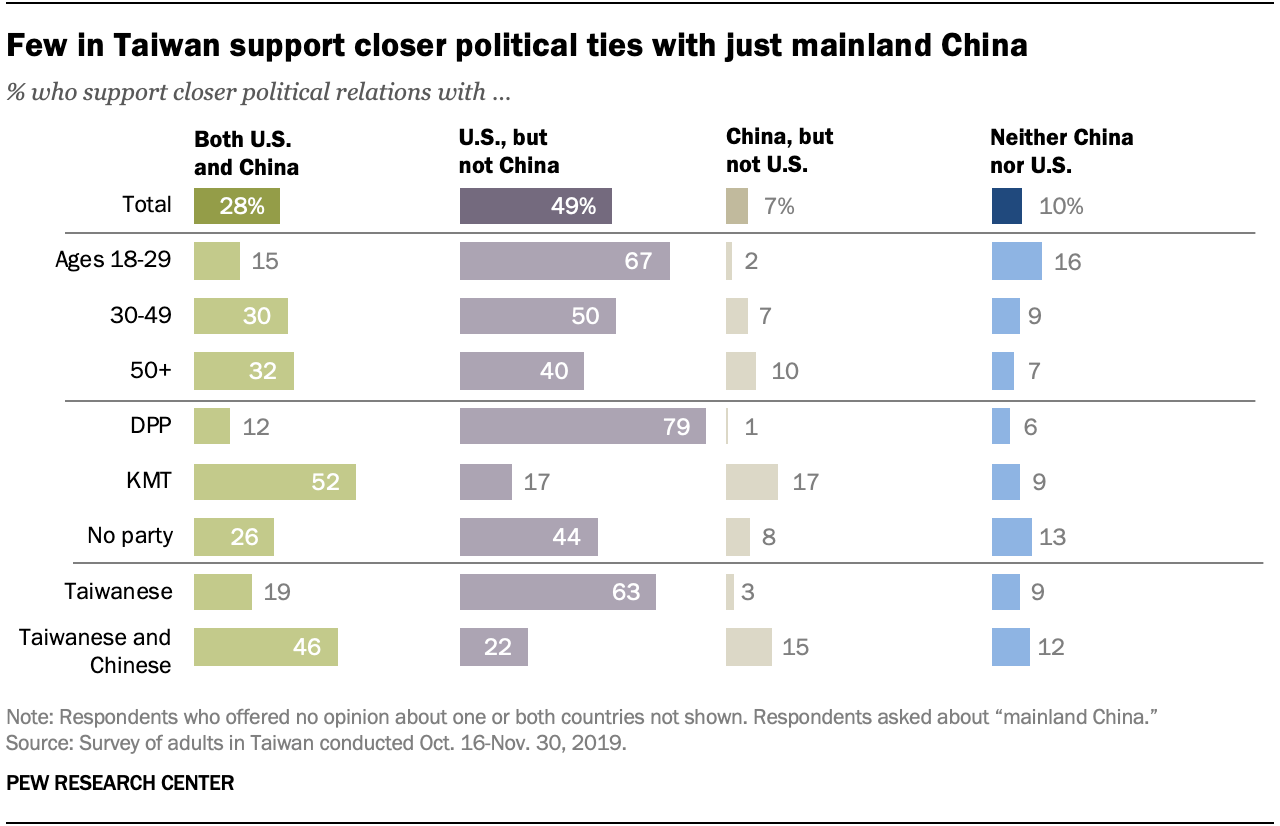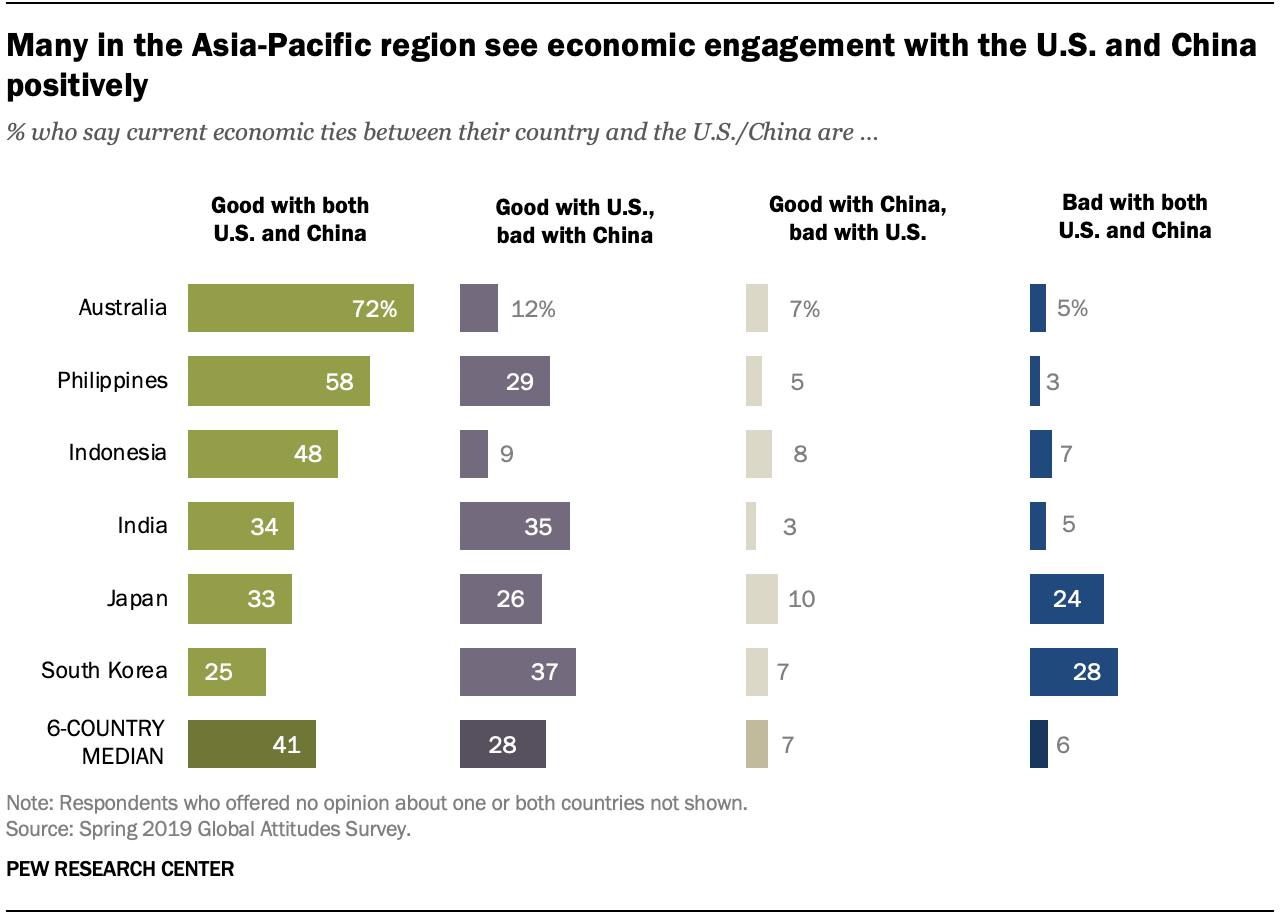 Politically, Taiwan is often a flashpoint in U.S.-China relations, caught between the two superpowers and pulled in both directions. When it comes to public views of the superpowers, there is little ambiguity: Adults in Taiwan have much more favorable views of the U.S. than mainland China and, by a wide margin, prefer closer political relations with Washington than Beijing. But when it comes to economic relations, some in the region are more willing to work with both Beijing and Washington, rather than choosing one or the other, according to a new Pew Research Center analysis.
Politically, Taiwan is often a flashpoint in U.S.-China relations, caught between the two superpowers and pulled in both directions. When it comes to public views of the superpowers, there is little ambiguity: Adults in Taiwan have much more favorable views of the U.S. than mainland China and, by a wide margin, prefer closer political relations with Washington than Beijing. But when it comes to economic relations, some in the region are more willing to work with both Beijing and Washington, rather than choosing one or the other, according to a new Pew Research Center analysis.
Among adults in Taiwan, favorable views of the U.S. generally come at the expense of mainland China. A plurality of 42% hold favorable views of the U.S. and unfavorable views of the mainland. Just 11% of adults in Taiwan report positive attitudes toward mainland China but not toward the U.S. Roughly a quarter voice favorable opinions of both countries, and about two-in-ten see both the U.S. and mainland China in a negative light.
Pew Research Center surveys have long tracked the competition between the U.S. and China when it comes to how people around the world view the two superpowers. The data featured here includes comparisons of attitudes at the individual level, such as what share of the public has positive attitudes of both the U.S. and China. This post looks at the Asia-Pacific region, where China has a major geopolitical footprint, with a focus on Taiwan.
This analysis draws on two surveys. The first is a telephone survey in Taiwan of 1,562 respondents conducted Oct. 16 to Nov. 30, 2019, representative of the adult population of Taiwan. The post also contains comparative data points from six Asia-Pacific countries: Australia, India, Indonesia, Japan, the Philippines and South Korea. This data comes from the 2019 Global Attitudes Survey of 7,778 adults conducted from May 18 to Oct. 2, 2019. The surveys were conducted on the phone in Australia, Japan and South Korea and face-to-face in India, Indonesia and the Philippines. Fieldwork for both surveys was completed prior to Taiwan’s January presidential election and the start of the coronavirus outbreak in mainland China.
Here are the questions used for the report, along with responses, and its methodology.
 Politically, people also tend to see a trade-off between the two superpowers. About half of adults in Taiwan (49%) would support closer political ties to the U.S. but would not say the same of mainland China. Adults who prefer political ties to the U.S. over ties to the mainland are more likely to be ages 18 to 29, support the currently ruling DPP or identify solely as Taiwanese. No more than about one-in-ten reject closer political ties to both countries or support closer political ties with China but not the U.S.
Politically, people also tend to see a trade-off between the two superpowers. About half of adults in Taiwan (49%) would support closer political ties to the U.S. but would not say the same of mainland China. Adults who prefer political ties to the U.S. over ties to the mainland are more likely to be ages 18 to 29, support the currently ruling DPP or identify solely as Taiwanese. No more than about one-in-ten reject closer political ties to both countries or support closer political ties with China but not the U.S.
Only around a quarter of adults (28%) support closer political ties with both the U.S. and mainland China.
However, adults in Taiwan do not see closer economic ties with the U.S. and mainland China in the same zero-sum terms. Overall, people are more supportive of greater economic engagement with the U.S. (85%) than with mainland China (52%). Still, 45% of the public would like closer economic relations with both superpowers. Few want to distance themselves economically from both superpowers (5%) or to collaborate with mainland China but not the United States (7%).
Generally speaking, the patterns of which groups see economic relations as zero-sum are similar to attitudes about political relations: Those under 30, those who support the DPP and those who identify as just Taiwanese all prefer economic relations with the U.S. but not mainland China.
 In many respects, these patterns in Taiwan are similar to those observed elsewhere in the Asia-Pacific region. For example, across six other Asia-Pacific publics, more adults hold favorable views of the U.S. than China. This division is most apparent in Japan and South Korea, where 56% and 46%, respectively, have a positive opinion of the U.S. while also having a negative view of China. In other parts of the Asia-Pacific, the U.S. generally receives better reviews than China, though this is less clearly at the expense of China. Younger people in Japan, South Korea and Taiwan are especially likely to concurrently see the U.S. favorably and China negatively, with roughly half or more holding these views.
In many respects, these patterns in Taiwan are similar to those observed elsewhere in the Asia-Pacific region. For example, across six other Asia-Pacific publics, more adults hold favorable views of the U.S. than China. This division is most apparent in Japan and South Korea, where 56% and 46%, respectively, have a positive opinion of the U.S. while also having a negative view of China. In other parts of the Asia-Pacific, the U.S. generally receives better reviews than China, though this is less clearly at the expense of China. Younger people in Japan, South Korea and Taiwan are especially likely to concurrently see the U.S. favorably and China negatively, with roughly half or more holding these views.
And, as in Taiwan, many other publics in the Asia-Pacific region see economic engagement with both the U.S. and China in positive terms. For example, pluralities or majorities in Australia, the Philippines and Indonesia say their country’s current economic ties with the U.S. and China are good. While opinions in Japan, India and South Korea are more divided, a quarter or more in each country say ties with both Beijing and Washington are good.




